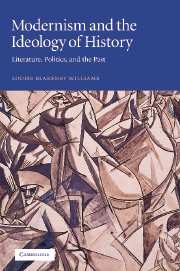Book contents
- Frontmatter
- Contents
- Acknowledgements
- Abbreviations
- Introduction
- 1 “Immaterial pleasure houses”: the initial aesthetic dilemma
- 2 “A more dream-heavy hour”: medievalist and progressive beginnings
- 3 “Pedantry and hysteria”: contemporary political problems
- 4 “A certain discipline”: radical conservative solutions
- 5 “A particularly lively wheel”: cyclic views emerge
- 6 “Our own image”: the example of Asian and non-Western cultures
- 7 In “the grip of the … vortex”: the proof of Post-Impressionist art
- 8 The “cycle dance”: cyclic history arrives
- 9 “The Nightmare” and beyond: the First World War and mature cyclic theories
- Conclusion
- Notes
- Index
3 - “Pedantry and hysteria”: contemporary political problems
Published online by Cambridge University Press: 22 September 2009
- Frontmatter
- Contents
- Acknowledgements
- Abbreviations
- Introduction
- 1 “Immaterial pleasure houses”: the initial aesthetic dilemma
- 2 “A more dream-heavy hour”: medievalist and progressive beginnings
- 3 “Pedantry and hysteria”: contemporary political problems
- 4 “A certain discipline”: radical conservative solutions
- 5 “A particularly lively wheel”: cyclic views emerge
- 6 “Our own image”: the example of Asian and non-Western cultures
- 7 In “the grip of the … vortex”: the proof of Post-Impressionist art
- 8 The “cycle dance”: cyclic history arrives
- 9 “The Nightmare” and beyond: the First World War and mature cyclic theories
- Conclusion
- Notes
- Index
Summary
In our age it is impossible to create, as I had dreamed, an heroic and passionate conception of life worthy of the study of men elsewhere and at other times … There was a time when I thought of a noble body for all eyes, a soul for subtle understandings, and, to unite these two, Eleusinian rites. Instead, the people cry out for stones and vapour, pedantry and hysteria, rhetoric and sentiment.
W.B. Yeats, “Journal,” 1909.On January 26, 1907 Yeats was proud to present, in the Abbey Theatre he had worked so hard to found three years earlier, a play by an author he regarded as the greatest living Irish playwright – the Playboy of the Western World by J.M. Synge. It was to be the culmination of his dream that a great literature of beauty could save the Irish nation. The Irish public, however, did not unanimously share Yeats's views of the role of this sort of art. The play was interrupted by so much booing and hissing from one section of the audience that the actors could not be heard. On the last night of the performance, five hundred police had to be called in. Street riots followed and continued for a week. Clearly something serious had gone wrong with Yeats's aesthetic theory. As the quote above indicates, he was well aware of this fact.
- Type
- Chapter
- Information
- Modernism and the Ideology of HistoryLiterature, Politics, and the Past, pp. 55 - 73Publisher: Cambridge University PressPrint publication year: 2002



